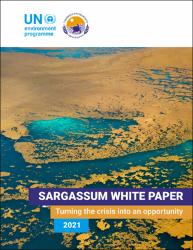/admin/item?itemID=f4d87f67-e341-41d6-8d2c-c624dda49681
Sargassum white paper : turning the crisis into an opportunity

View/
Type of Access
OpenMaterial Type
BookletLanguage
EnglishCollection
- Gestión ambiental [2934]
Metadata
Show full item record| Abstract: | Since 2011, Caribbean coastlines have been subject to unprecedented, massive, episodic influxes of floating sargassum seaweed. While 2020 was relatively mild in terms of sargassum volumes, and a global pandemic became the overarching worry, 2018 was record breaking in terms of sargassum volumes reaching Caribbean shores and 2019 was also significant. Floating sargassum should not be construed as negative in and of itself – it is beneficial at sea, mainly as a unique pelagic habitat. However, the mass stranding of sargassum on coastlines has significant negative impacts (biophysical and socio-economic), particularly on coastal communities and livelihoods, public health, tourism and fisheries. The overall purpose of this white paper is to compile background information for a strategic status update and critical situational analysis that informs and elicits feedback from key regional stakeholders. It will also form the basis for development of a draft Concept Note for a UNEP Cartagena Convention-led project targeting key issues identified. |
| Author(s): | United Nations Environment Programme (UNEP)
Caribbean Environment Programme (CEP) |
| Date: | 2021 |
| Published: | Kingston: Ninth Meeting of the Scientific and Technical Advisory Committee (STAC) to the Protocol Concerning Specially Protected Areas and Wildlife (SPAW) in the Wider Caribbean Region |
| Citation: | United Nations Environment Programme, Caribbean Environment Programme (2021). Sargassum white paper: turning the crisis into an opportunity. Ninth Meeting of the Scientific and Technical Advisory Committee (STAC) to the Protocol Concerning Specially Protected Areas and Wildlife (SPAW) in the Wider Caribbean Region. Recuperado de: |
| URI: | https://bvearmb.do/handle/123456789/1531
|

